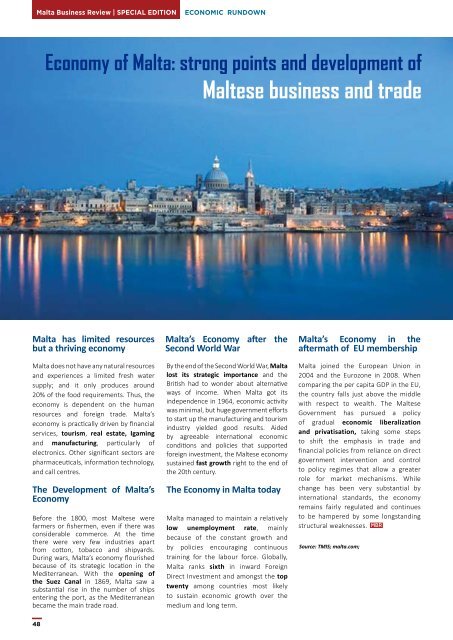You also want an ePaper? Increase the reach of your titles
YUMPU automatically turns print PDFs into web optimized ePapers that Google loves.
Malta Business Review | SPECIAL EDITION<br />
Economic Rundown<br />
JET<br />
Malta Business Review | SPECIAL EDITION<br />
Economy of Malta: strong points and development of<br />
Maltese business and trade<br />
Minister for Finance launches Joint Enforcement<br />
Task Force to combat black economy<br />
Minister for Finance Edward Scicluna<br />
announced the formation of a Joint<br />
Enforcement Task Force (JET) which<br />
will bolster the government’s efforts at<br />
combating the black economy.<br />
Speaking during a press conference,<br />
Minister Scicluna explained that through<br />
JET, the government will channel the<br />
resources and technical knowhow of the<br />
Income Tax Department, VAT Department<br />
and Tax Compliant Unit to various degrees<br />
in order to prevent, detect, investigate,<br />
and prosecute offences related to unfair<br />
business competition and the avoidance<br />
and evasion of Income Tax, VAT, National<br />
Insurance and Excise Tax in order to<br />
uphold the country’s licensing, regulatory<br />
and tax laws.<br />
“JET will in no way replace any of<br />
these entities and departments,”<br />
said Minister Scicluna, “it will serve<br />
as a centre of intelligence and a<br />
central coordination unit supporting<br />
increased cooperation between these<br />
departments and entities, as well as<br />
facilitating the sharing of information<br />
between them.” He also confirmed that<br />
JET will be enabled to spearhead its own<br />
risk assessments and investigations.<br />
PHOTO: DOI - KEVIN ABELA<br />
JET will be recruiting a core team of<br />
multidisciplinary professionals in the field<br />
of gathering of intelligence, risk analysis,<br />
inspections and investigations. The core<br />
team will be supported by staff from the<br />
various entities and departments who will<br />
be retrained for this purpose. MBR<br />
Sources: DOI/Ministry of Finance<br />
Malta has limited resources<br />
but a thriving economy<br />
Malta’s Economy after the<br />
Second World War<br />
Malta’s Economy in the<br />
aftermath of EU membership<br />
Malta does not have any natural resources<br />
and experiences a limited fresh water<br />
supply; and it only produces around<br />
20% of the food requirements. Thus, the<br />
economy is dependent on the human<br />
resources and foreign trade. Malta’s<br />
economy is practically driven by financial<br />
services, tourism, real estate, Igaming<br />
and manufacturing, particularly of<br />
electronics. Other significant sectors are<br />
pharmaceuticals, information technology,<br />
and call centres.<br />
The Development of Malta’s<br />
Economy<br />
Before the 1800, most Maltese were<br />
farmers or fishermen, even if there was<br />
considerable commerce. At the time<br />
there were very few industries apart<br />
from cotton, tobacco and shipyards.<br />
During wars, Malta’s economy flourished<br />
because of its strategic location in the<br />
Mediterranean. With the opening of<br />
the Suez Canal in 1869, Malta saw a<br />
substantial rise in the number of ships<br />
entering the port, as the Mediterranean<br />
became the main trade road.<br />
By the end of the Second World War, Malta<br />
lost its strategic importance and the<br />
British had to wonder about alternative<br />
ways of income. When Malta got its<br />
independence in 1964, economic activity<br />
was minimal, but huge government efforts<br />
to start up the manufacturing and tourism<br />
industry yielded good results. Aided<br />
by agreeable international economic<br />
conditions and policies that supported<br />
foreign investment, the Maltese economy<br />
sustained fast growth right to the end of<br />
the 20th century.<br />
The Economy in Malta today<br />
Malta managed to maintain a relatively<br />
<strong>low</strong> unemployment rate, mainly<br />
because of the constant growth and<br />
by policies encouraging continuous<br />
training for the labour force. Globally,<br />
Malta ranks sixth in inward Foreign<br />
Direct Investment and amongst the top<br />
twenty among countries most likely<br />
to sustain economic growth over the<br />
medium and long term.<br />
Malta joined the European Union in<br />
2004 and the Eurozone in 2008. When<br />
comparing the per capita GDP in the EU,<br />
the country falls just above the middle<br />
with respect to wealth. The Maltese<br />
Government has pursued a policy<br />
of gradual economic liberalization<br />
and privatisation, taking some steps<br />
to shift the emphasis in trade and<br />
financial policies from reliance on direct<br />
government intervention and control<br />
to policy regimes that al<strong>low</strong> a greater<br />
role for market mechanisms. While<br />
change has been very substantial by<br />
international standards, the economy<br />
remains fairly regulated and continues<br />
to be hampered by some longstanding<br />
structural weaknesses. MBR<br />
Source: TMIS; malta.com;<br />
Web: www.daikin.com.mt Email: info@maa.com.mt Tel: 2385 0400<br />
48 49<br />
www.maltabusinessreview.net

















